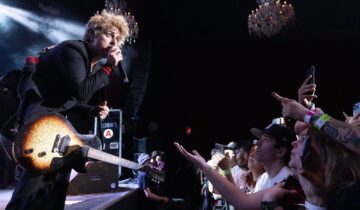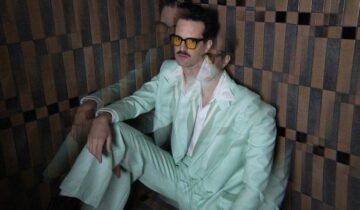 The GRAMMY-nominated SoCal reggae quartet return with their “proudest” work yet. Guitarist Taumata “Mata” Grey and bassist Ivan Kirimaua spoke to GRAMMY.com about their new album, ‘Celebration,’ which drops Aug. 25
The GRAMMY-nominated SoCal reggae quartet return with their “proudest” work yet. Guitarist Taumata “Mata” Grey and bassist Ivan Kirimaua spoke to GRAMMY.com about their new album, ‘Celebration,’ which drops Aug. 25
By GARY MOSKOWITZ for GRAMMY.com
Photo provided by Common Kings
When Taumata “Mata” Grey was growing up in Hawaii, there was always a guitar, a microphone, or a piano around the house. The youngest of four kids, there were musicians and entertainers in his Samoan family — including his dad, who would have preferred that his children stay away from the tough life of a traveling musician.
Mata did not heed those warnings.
When his family moved to Southern California, he gravitated toward other musicians. Connecting through friends within the Orange County Pacific Islander community in college, Mata eventually teamed up with Samoan-born Hawaiian singer Sasualei “Jr. King” Maliga, Fiji-born bassist Ivan “Uncle Lui” Kirimaua, and L.A.-born Tongan drummer Jerome “Big Rome” Taito to form Common Kings. Together, they began creating reggae music with elements of pop, rock, hip-hop, and island music.
The group released two EPs in 2013, toured as a support act for Justin Timberlake’s 20/20 Experience World Tour in 2014, then released another EP in 2015. Songs from those EPs were Top 10 hits on Billboard’s reggae charts. Their 2017 debut full-length album, Lost in Paradise, earned a GRAMMY nomination for Best Reggae Album.
On Aug. 25, Common Kings will release their sophomore album, Celebration, which features GRAMMY winner Kabaka Pyramid, J Boog and other friends. “This is our proudest piece we’ve ever done,” Grey declares.
GRAMMY.com recently spoke with members of the Common Kings over Zoom about their new album, upcoming fall tour, and history as friends and bandmates.
“Celebration,” the first single from your forthcoming album, is an anthem for friendship, nostalgia, and seizing the moment. How did those feelings and themes shape the new album?
Mata Grey: We’re all about celebrating life and happiness, and all we’ve been through as a band. It’s been 10 years-plus that we’ve been together. This album is about coming full circle, celebrating what we’ve done as a band. “Celebration” is a great graduation song, or for any celebration people are having in life. This is our celebration tour.
Ivan Kirimaua: We’ve forged our own little path as four Polynesian boys, and now we tour with groups like Slightly Stoopid and Meghan Trainor, and we’re friends with Stephen Marley.
But we don’t take any of this lightly. We can branch out and do different things musically, but when people hear us, they know it’s Common Kings. We’re celebrating all that we’ve done these last 10 years together.
What specific goals did you have for this second album?
Kirimaua: We went to Miami and had a writing camp. We ended up with this body of work that we didn’t actually plan, but it all fit in naturally.
Grey: Our good friend [GRAMMY-nominated producer and songwriter] Poo Bear had just moved to Miami, and Miami was popping. We just got an AirBnb, made writing stations, and banged away for about 18 months. We wrote 120 songs, then picked about 22 or 24. This is our proudest piece we’ve ever done.
You also recorded in Southern California, Hawaii and Nashville. Why so much moving around?
Grey: It was an experience like no other. We reached out to a lot of writers, artists and producers. We would spend a week or so at a studio or house, set up three or four recording stations, then mix and match melodies. We used cult classic films as inspiration and it kind of morphed — not just island reggae but also into rock.
We made our mark of what our sound is with the first album, so we said let’s put our foot forward and push the envelope sonically a little bit. There was lots of experimenting.
You mentioned cult classic films helped inspire you. How so, and which ones?
Grey: It really helped to go into these writing camps with some kind of game plan. We brought in elements of The Last Dragon, Tommy Boy, Reservoir Dogs, Kill Bill — any Tarantino film. We’d find some kind of hook, or a line, or riff, and run with it.
Kirimaua: If you hang out with us, we are constantly cracking jokes and dropping lines from movies.
Poo Bear is one of Justin Bieber’s main collaborators. He’s also collaborated with Usher, Mariah Carey and many others. What is it like to work with him, and how did he help you get the album to where you wanted it to be?
Grey: There’s only a few people we’ve been so amazed at. We just trip out on his talent. He is so quick to come up with catchy word play or a melody, and piece it together. He can make a hit record in 30 minutes. You’re just looking at him, trying to understand. He makes it look so easy.
Kirimaua: In the music biz, there are levels. Like in football, there are elite champion athletes who can eat a cheeseburger and drink a coke and score a bunch of touchdowns in their sleep, and then there are guys on the bench who have to count calories, just hoping to see some playing time. If you have pride or big headedness, there is a 99.9999 percent failure rate in music.
Grey: We’re the guys who have to count calories. Poo Bear and Meghan Trainor are eating cheeseburgers.
You’re being humble. You’ve worked hard to get to where you’re at.
Kirimaua: No team is great unless they have great leadership and a great front office. We have been blessed with Tua [Tautua Reed, Island Empire CMO and artist manager]. He’s a different breed. He played football in high school, and their coach before every game would scare the s— out of them that they were going to lose, that they were going to embarrass themselves. They would over-prepare and blow out teams.
The concept is that you can lose it all at any minute. That’s how we are. Knowing it could all end tomorrow. That’s been the last 10 years.
Grey: We trust each other and trust the process. No egos. We’re a band of brothers first. We’re grateful to do what we love.
Kirimaua: All four of us come from strong families who raised us to always be respectful, the Polynesian way. The highest form of respect in Polynesian culture is respect and service. We are in service to each other and the people around us. We pride ourselves on that.
Your first album, Lost in Paradise, was nominated for a GRAMMY. What was that like for you?
Kirimaua: We were in this 100-year-old haunted hotel in Grand Junction [Colorado] when we got the call, at like 3 in the morning. Forever, we will always have that [GRAMMY]. It became something for us to live up to. There’s a certain expectation. People are in for an experience. For us, we knew we had to step it up.
Grey: We were like, OK we made the team, now let’s not lose our spot.
Let’s talk about the early days of the band. You were friends from college in Orange County. What was happening in your lives at that time?
Grey: I started jamming around 13, playing in church. I was working at a hotel, at a Claim Jumper [Steakhouse & Bar]. The other guys were working as a notary, as a paralegal, doing database stuff. I met everyone in the band through friends at Orange Coast College and UC Irvine. We started entering battle of the bands competitions on the college circuit and won them. We started getting gigs through MySpace and Craigslist.
How did Orange County and Southern California help shape your sound?
Grey: My brother was in bands while in college, and he heard a small band from Long Beach called Sublime. We were both like, we don’t know what this is. It’s not exactly reggae, not quite rock. He let me listen to their album 40 oz To Freedom, at 13 and it blew my mind.
I grew up on Jim Croce, Michael McDonald, the Doobie Brothers. We were like these bass lines sound like reggae but I think that dude is white. Then we got into Pennywise, Bob Marley, Toots and the Maytals. For us, reggae was a big part of us as people, but we were like, how can we be our own fusion band?
Kirimaua: I grew up listening to Ozomatli and Buena Vista Social Club. Jerome loved 311. Between all of us and our musical influences, we just really needed to be directed. Tua told us there’s your artist hat, and then there’s your “how can I do this for the rest of your life” hat. He said it has to be about what you’re able to make people feel when they come see you.
Grey: We did everything backwards. Usually you create a fanbase, then release albums. For us, we released one single, went on tour for that one single and played a bunch of covers. We played 45-minute sets.
Now you’re touring this Fall with Steel Pulse, a British reggae band who was the first non-Jamaican group to win a GRAMMY for Best Reggae Album.
Grey: When I heard [1982 Steel Pulse album] True Democracy, I was like who is this? They are my favorite reggae band of all time. [Steel Pulse founder and singer] David Hinds was a big inspiration to help mold us. When we got the call that Steel Pulse agreed to be the support act, I lost it. I was like, are you kidding me?
When you have one of the bands you grew up with open for you on your tour? That’s the epitome of all the hard work, a sign of what you’ve done right. No better feeling.
What’s next after the Fall tour? What are your goals for 2024?
Kirimaua: We’re gonna focus on enjoying where we are. We’ll go back to releasing singles and collab with as many people as we can and just not be stressing. We’ve literally been running for 10 years, focused on shows, nonstop war-room conference calls till 3 a.m., talking about what’s next. This album will dictate what happens in 2024. We’re looking forward to going back in the studio to work, do more collabs, and just celebrate.



